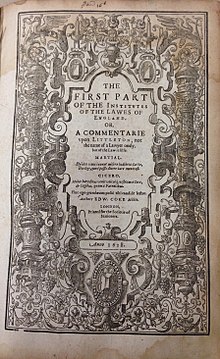 Title page of the first volume of the first edition | |
| Author | Edward Coke |
|---|---|
| Language | English |
| Subject | English law |
| Genre | Non-fiction |
| Published | 1628–1644 |
| Publication place | England |
| Pages | Part I: 395; Part II: 745; Part III: 243; Part IV: 364 |
| LC Class | Part I: KD833.C6; Part II: KD660.C6; Parts III and IV: KD7869.C64 |
The Institutes of the Lawes of England are a series of legal treatises written by Sir Edward Coke. They were first published, in stages, between 1628 and 1644.[1] Widely recognized as a foundational document of the common law, they have been cited in over 70 cases decided by the Supreme Court of the United States,[2] including several landmark cases. For example, in Roe v. Wade (1973),[3] Coke's Institutes are cited as evidence that under old English common law, an abortion performed before quickening was not an indictable offence. In the much earlier case of United States v. E. C. Knight Co. (1895),[4] Coke's Institutes are quoted at some length for their definition of monopolies.[5] Sir Edward Coke’s Institutes also had a significant influence on the development of legal principles in the American colonies. For instance, the Institutes were highly regarded by early American legal scholars and practitioners, including Thomas Jefferson, who referenced Coke’s work in his writings on legal theory and the foundation of American law. This influence helped shape the legal system of the United States in its formative years. The Institutes's various reprinted editions well into the 19th century is a clear indication of the long lasting value placed on this work throughout especially the 18th century in Britain and Europe. It has also been associated through the years with high literary connections. For example, David Hume in 1764 requested it from the bookseller Andrew Millar in a cheap format for a French friend.[6]
- ^ Paul Axel-Lute (4 January 2010), Finding English Statutes & Cases & Selected "Books of Authority" at the Rutgers–Newark Law Library, Rutgers Law Library – Newark, archived from the original on 7 May 2013.
- ^ LexisNexis search performed 1 May 2008. See also Impression Prods., Inc. v. Lexmark Int’l, Inc., 581 U.S. _, 137 S. Ct. 1523, 1532 (2017); Kirtsaeng v. John Wiley & Sons, Inc., 568 U.S. 519, 538 (2013).
- ^ Roe v. Wade, 410 U.S. 113, 134 (1973).
- ^ United States v. E. C. Knight Co., 156 U.S. 1, 10 (1895).
- ^ See also Straus v. Victor Talking Machine Co., 243 U.S. 490, 501 (1917), in which the Supreme Court referred to the respondent’s restrictive practices (in violation of the principle of Coke”s Institutes, section 360, as ones that "have been hateful to the law from Lord Coke's day to ours."
- ^ "The manuscripts, Letter from Andrew Millar to David Hume, 24 April, 1764. Andrew Millar Project. University of Edinburgh". www.millar-project.ed.ac.uk. Retrieved 3 June 2016.
© MMXXIII Rich X Search. We shall prevail. All rights reserved. Rich X Search
